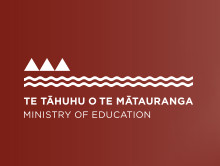Te kauhoe nui katoa o te ao
Nā Peti Nohotima
'Te kauhoe nui katoa o te ao' story by Peti Nohotima, with page numbers from He Kohikohinga 36.
This play features a young 8 year old who comes to town to race in the inter-school swimming races. Upon seeing the large Olympic size pool, coupled with the large crowd causes him to feel very anxious to the point of feeling sick. His whānau are there cheering him on.
Features to consider from the text:
Readability
Supports
- Photographs
- Reputation of key phrases for teaching freestyle
Challenges
- Words and ideas that some students may find challenging, rika, taki tūpapa, whātoro whāroa, ringa hema (left hand), ringa katau (right hand)
Language features
- kīwaha; hei aha atu hoki… Kei te tino rika mātau
- puta mai ana ōna karu me te ruru o tōna māhunga,
- simple phrases for teaching freestyle whātoro, whakakapu, pana, whanawhana
Introducing students to the text
- Read rotarota kauhoe. This rotarota may be used as a warm up activity before students go swimming. Children in groups make up actions for each of the verses.
- Discuss with students swimming lessons.
- Introduce the terms and words introduced in this text. Kau tāwhai, whātoro, whakakapu, pana, whanawhana. Say the words whilst showing what the appropriate actions are. These words should be prepared before the reading session. Either on cards or written on the wordboard.
During the reading
- Encourage students to identify phrases and words that they are not familiar with. Before reading you should identify what these may be, and prepare brief explanations, (see language features).
- Ask students to recall a similar situation whereby they just wanted to jump in without instructions and discuss the consequences of such actions.
- Students may read the text independently or in pairs.
- Ask students to look out for the phrases that describe the action of swimming.
After the reading: Responding to the text
Possible focuses for discussion
- Discuss need for knowing how to swim.
- Pool rules, why is there a need for them, what rules presently exist at your local pool and how reasonable are they.
- Discuss other swimming strokes.
Suggested activities
| Ngā pūkenga | Learning outcomes | Learning experiences |
|---|---|---|
| Students will be able to: | Students could: | |
| Ko te whakakotahi i te reo ataata me te reo ā-waha (p.103) | read aloud informally with fluency and expression | students prepare to perform this play for an audience |
| Ko te tuhi i ngā tuhinga whakaahua poto e pā ana ki ōna wheako whaiaro (p.85) | write dialogue between persons, expressing ideas | write a play about an incident where you have felt very anxious |
| Ko te āhuatanga o te whakaaro reo ataata (p.95) | present ideas using simple layout. | design a backdrop for the play. |
Cross curricular links
Language: Written language.
Health and physical education: Swimming and safety in the water.



